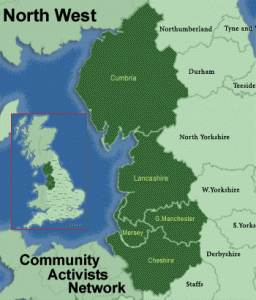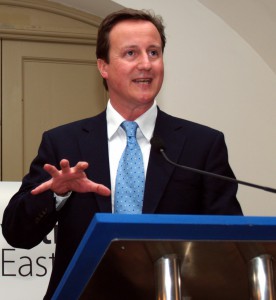Just what is “The Big Society”?
Article published: Thursday, September 23rd 2010
Earlier this month the government dispatched cabinet office member Neil Smith to Manchester for a panel discussion about David Cameron’s ‘Big Society’. Over 100 representatives of charities, social enterprises and public bodies from across the North West and beyond gathered to hear the civil servant do his level best to explain what’s in store…
Organised by the North West Community Activist Network (NWCAN), the event soon became booked out three times beyond capacity. The panel was chaired by Pam Stewart of NWCAN and consisted of senior civil servant Neil Smith, Maxine Moar of Oldham Council and the Home Office and Bernard Davies of the National Coalition for Independent Action (NCIA).
Stevens began the meeting by noting the difficulties faced by the voluntary sector at a time of decreasing numbers of volunteers and funding, warning the panel that “the only certainty is the uncertainty of our future.” Smith was of little help on that score, insisting what he could reveal should not be taken as final government policy and freely admitting there was “not an awful lot I can say for definite.”
What is known is that 5,000 community organisers are to be trained, as Smith put it, “to support communities to become more self-reliant.” Who these organisers will be and what funding they have is still undecided, although the government is rumoured to be in discussions with several high-profile campaigning and active charities to help inform their training.
Community organisers are to be supported by Community First, a programme targeting 100 areas identified as having high deprivation and low social cohesion to provide grants encouraging “more social action” to “help others and themselves improve quality of life.” There are no equalities commitments in the scheme and Smith himself mused that “community organisation is not necessarily equality-based, [though] community development is more so.”
Furthermore, he was clear the funds will not be a grassroots “handout” programme but would be focused on “addressing the priorities that a community has identified for itself.” Through a “strong link to the community organisers programme”, of course.
Dissent broke out at this point, with one woman in the audience objecting to the characterisation of grassroots grants as handouts for nice things. “It’s not a ‘nice thing’. These communities are fractured,” she said before condemning the implications of national government picking out community organisers from above as “just like national indicators.”
In Smith’s defence he did say he would prefer to work with existing community groups wherever possible. But many of the changes envisaged by the Big Society are likely to have a major impact on the civil society we already have.
Bernard Davies of NCIA, a loose association of organisations brought together by concerns that voluntary groups are losing their autonomy, was quick to point out that the Big Society comes at a time of extensive cuts for the voluntary sector. £1.2 billion from local council grant programmes, £1.1 million cuts to the budget for the Office for Civil Society and £9 million gone from the youth volunteering budget were just a few he highlighted. For Davies, the Big Society was the “cover story” for cuts that will undermine the ability of both the public and voluntary sectors to meet people’s needs.
35% of voluntary sector funding comes from the government, of which half takes the form of contracts and half grants according to research by the Charity Finance Directors’ Group. Spending cuts, coupled with the move away from “handouts”, are likely to have severe consequences for the freedom of charities highly dependent on public funds.
Davies also spoke of the need to “challenge the role of agencies colluding with the privatisation of public services through the colonisation of the voluntary sector.”
 A glance at Tory plans to build on New Labour’s marketisation of the public sector, with the new government keen to introduce payment by results and expand competitive tendering, suggest his fears are not baseless. Charities forced into competition with one another to bid for diminishing funds may find their co-operative civic values under threat as they become co-opted into delivering what Davies called “the state’s agendas, values and purposes.”
A glance at Tory plans to build on New Labour’s marketisation of the public sector, with the new government keen to introduce payment by results and expand competitive tendering, suggest his fears are not baseless. Charities forced into competition with one another to bid for diminishing funds may find their co-operative civic values under threat as they become co-opted into delivering what Davies called “the state’s agendas, values and purposes.”
In essence, while the government has a clear idea of what it expects from society it is determined to keep a laissez-faire attitude when it comes to what society asks in return. Maxine Moar’s presentation on ‘neighbourhood agreements’, schemes by which local community groups are given some monitoring and oversight over how public services are delivered, was offered as an example of empowerment. Yet her vision of the Big Society meaning “everyone singing from the same hymn sheet” does not seem to account for when people wish to depart from the script.
Indications as to how far a community organiser will be permitted to push came out in the lively Q&A session following the main speeches. When asked what protections would be available for people challenging a recognised organisation, Smith’s response was to say “I think it’s about how you conduct your business,” sidestepping the need for greater protections for whistleblowers and people who challenge established vested interests.
Perhaps most telling of all was the insistence that community organisers and the Big Society itself are not to be seen as political. Keeping the political undertones of the scheme from becoming obvious will be crucial if the government is to succeed in its bid to have community groups carry out its social policy. Otherwise they may demand more from the state than the Conservatives are willing to grant.
Richard Goulding
More: Features, Manchester, News
Comments
-
Really good to get an independent view – thanks Richard.
One small typo – Pam Stewart chaired the meeting, not Pam Stevens.
The ‘official’ report can be found at http://nwcan.org/index.php?page=big-society-2-sept
Cheers, Joe Taylor – secretary NWCAN
Comment by Joe Taylor on September 24, 2010 at 1:26 am -
So can someone please explain really what is the Big Society?
I thought each and everyone of us is part of the bigger picture. And who are the groups going to be part of this so-called “Big Society”?
Comment by Michael Snaith on October 13, 2010 at 3:14 pm
The comments are closed.




